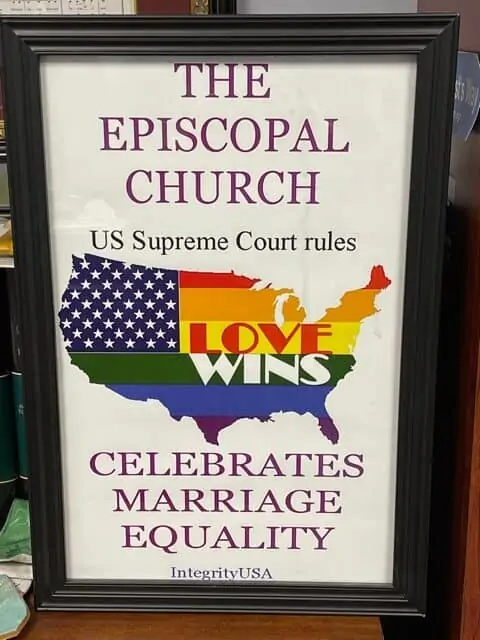Dear friends,
I remember exactly where I was on June 26, 2015 when I heard the news. I was in Salt Lake City at the Episcopal Church’s General Convention, a triennial meeting of all bishops, and clergy and lay representatives from every diocese in the Episcopal Church. We were getting ready for the morning worship service when a buzz began in the halls. The U.S. Supreme Court had just handed down its decision making same-sex marriages the law of the land. There was a spontaneous outburst of joy from those gathered in the convention halls. A few days later we voted to approve a change in the Church’s marriage canons (laws), making them gender neutral — talking about marriage as the binding together of a couple, rather than a man and a woman.
Finally, the law had caught up with our theology, that marriage is a lifelong covenant of love between two adults, no matter what their gender may be. Finally, our LGBTQ parishioners would have full civil rights and sacramental rites available to them. It was a time to rejoice.
The memories of those days came back to me yesterday as I read the Catholic Church’s judgment that priests could not bless same-sex unions. Although the judgment was not a surprise, the language and tone were harsh, saying that God “does not and cannot bless sin.”
Of course, the Catholic Church is not alone in this judgment. In this country, Episcopalians, Presbyterians, Lutherans, and the United Church of Christ all allow its clergy to officiate at and bless same-sex marriages. Methodists do not. Neither do Southern Baptists or most Pentecostal and fundamentalist churches.
In one sense the inner workings and decisions of another denomination are not our concern. But in another sense they are. This judgment from the Vatican hurts its LGBTQ members, of course, but it also affects others far beyond the church.
In recent years our society has broadened its understanding of human sexuality and has become much more accepting of LGBTQ people. Even 10 or 15 years ago the idea of same-sex marriages becoming legal was almost unthinkable. Progress has been made. But the truth is that gay and trans youth are still more vulnerable to bullying and discrimination. Gay and lesbian youth are five times more likely to attempt suicide than their heterosexual peers. Almost 40 percent of transgender adults say they have attempted suicide, most before the age of 25.
Too many times Christian teachings have added to the burdens LGBTQ, making them feel like they are “less than,” that there is something wrong and sinful about the way they are created. I fear that yesterday’s announcement from the Vatican gives more weight to that kind of thinking, and will add to the pain of too. many people.
I won’t go into all the scriptural and theological debates, but the Episcopal Church’s teaching (which evolved over decades, sometimes painfully slowly) is that all people are created in the image of God. God is love, and is present in healthy expressions of human love. Marriage is a covenant of mutual respect, love, and faithfulness between two consenting adults. God blesses those relationships whether the church does or not.

